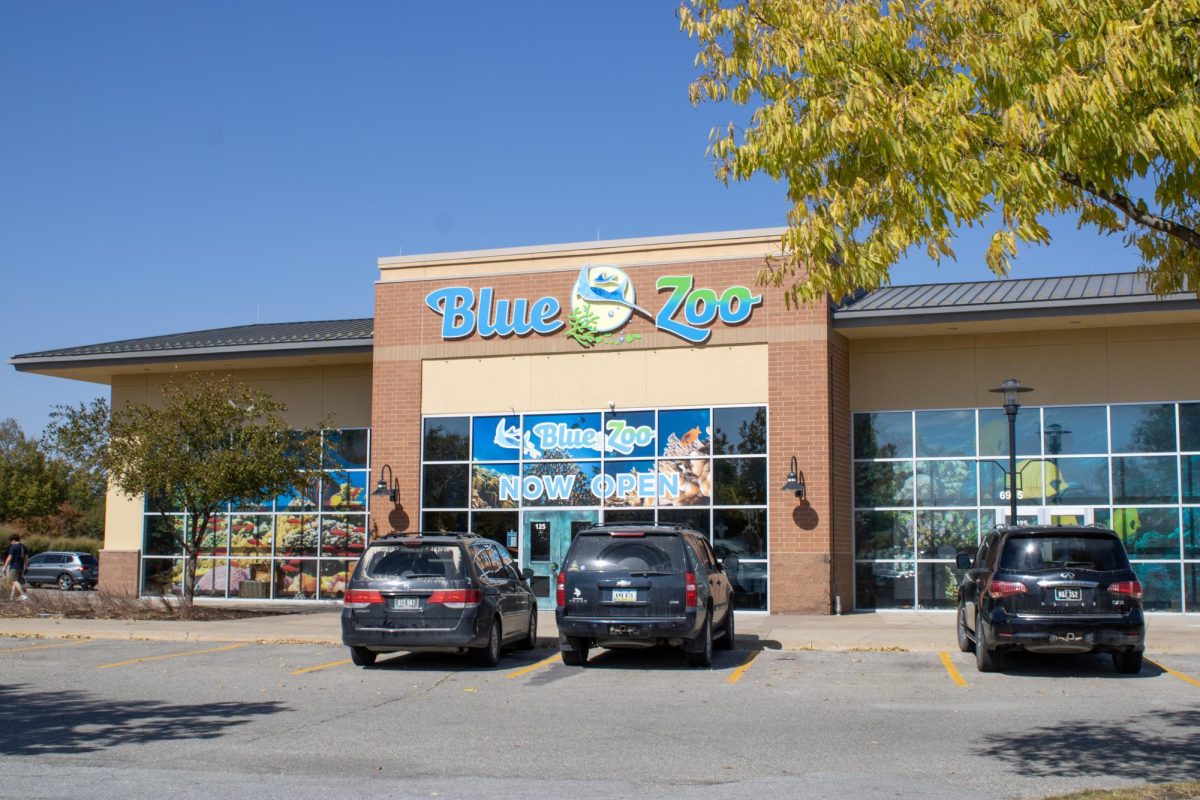On May 21, a new attraction emerged in Jordan Creek Town Center: Blue Zoo Aquarium. The for-profit facility was founded in 2019 in Spokane, Wash. and now has other locations in Oklahoma City, Baton Rouge, La. and Rogers, Ark. The Blue Zoo website states that the founder, Wes Haws, wants to “provide access to sea life but also teach future generations about the importance of marine conservation.”
The Des Moines location gets a few hundred visitors daily. Guests fill out a waiver releasing Blue Zoo of any liability for not adhering to the safety rules given by staff.
According to the Blue Zoo website, in 2010, Haws was working on an agricultural project in Ethiopia, building dome houses. As he worked, he was struck in the head by a villager with an axe. Thanks to the workers who accompanied Haws that morning and air transport to a hospital, Haws survived.
During his recovery, the only thing that held his interest was a fish tank. The tank kept his mind busy, and he enjoyed learning about the different species it could host. Later, he founded Blue Zoo, hoping to bring sea life to people who could not access it to better help them understand the importance of marine conservation. According to Dawn Larsen, assistant director and head of husbandry at the Des Moines location, Haws no longer owns the Blue Zoo franchise, but his daughter is still involved in the management.
Blue Zoo hosts a variety of species, from stingrays to sharks to seahorses. Larsen is knowledgeable about all of the species in the aquarium. She shared that the Des Moines location’s largest saltwater tank is 44,000 gallons and contains mostly sharks.
Since its opening, Blue Zoo has experienced two animal welfare incidents: A child stepped on a parakeet on May 22, and a bamboo shark bit a keeper on July 22. Other Blue Zoo locations do not appear to have had issues with animal deaths, but according to an InLander article, children were attempting to ride a tortoise with no staff intervention in the Spokane location. Some animal rights groups are calling for investigations to shut down the Des Moines location of Blue Zoo, citing its lack of American Association of Zoos and Aquariums accreditation.
“We are not going to meet the standards that the AZA has,” Larsen said. “We meet the standards for everything else…We work with USDA, and we have a regular vet that comes in.”
Accreditation from the AZA ensures that facilities are held to a high standard of care for their animals. However, AZA accreditations are expensive and difficult to acquire. A lengthy questionnaire, several facility inspections and Accreditation Commission reviews are all required of facilities that wish to become members of the AZA.
“Accreditation is an agreement within a profession that having and enforcing certain standards has value, and a mechanism for fairly deciding who does and doesn’t meet those standards,” Michael Renner, a zoo and conservation science professor at Drake, said in an email interview.
“There’s nothing stopping a non-accredited facility from being the best in the world, but there’s nothing that insists on it, either,” Renner stated. “So it might be great, or it might not be even minimally adequate.”
Larsen argues that Blue Zoo demonstrates a dedication to their mission to educate and foster curiosity about sea life, such as through birthday parties and field trips.
“Every day, from noon to one, we have a reptile show. So we’ve got an education staff member that comes out with a specific animal. We just sit and educate the kids on [the animal] and the kids are able to interact [with them],” Larsen said.








Beth Younger • Nov 1, 2024 at 10:20 am
In response to this article I wrote a letter to the editor, but I’ve not yet received a reply. So I thought I’d comment on this article here. Blue Zoo “aquarium” is nothing more than a fancy roadside attraction that uses and abuses animals for profit. If you look at previous stories about this place in the Register you will read about a patron “accidentally” killing a bird. You will also read about the mishandling of a small shark which ended with the venue euthanizing the creature.
This place is NOT ACCREDITED, as this article correctly reports. Why is that? Perhaps it is because of money. Perhaps it is because the for-profit aquarium doesn’t want to have to hire properly trained staff and doesn’t want to live up to the rigorous standards accreditation would require.
There is nothing good about Blue Zoo. It is just a place that uses and abuses vulnerable creatures for profit. They should be shut down.